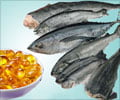A Virginia Tech researcher has discovered a way to grow omega-3 fatty acids, known for their potential human health benefits, by using a byproduct of the emerging biodiesel industry.
A way to grow omega-3 fatty acids, known for their potential human health benefits has been developed by a Virginia Tech researcher using a byproduct of the emerging biodiesel industry.
Zhiyou Wen, assistant professor of biological systems engineering in Virginia Tech's College of Agriculture and Life Sciences, presented his findings at the 236th national meeting of the American Chemical Society (ACS) in Philadelphia on Thursday."High energy prices have led to an increase in biodiesel production, which in turn has led to an increase in the amount of crude glycerol in the market," he said.
The researcher further said that biodiesel plants leave behind approximately 10 per cent crude glycerol during the production process, which led the price of the chemical compound to drop in recent years.
Highlighted that fact that the rise in biodiesel production over the last decade had made it difficult for the market to absorb all the extra glycerol, he stressed the need for alternative means for disposing of crude glycerol, which is prohibitively expensive to purify for industry use.
Wen revealed that his team had developed a novel fermentation process using microalgae to produce omega-3 fatty acids from crude glycerol.
"We have shown that it is possible to use the crude glycerol byproduct from the biodiesel industry as a carbon source for microalgae that produce omega-3 fatty acids. After thorough chemical analysis, we have also shown that the algae biomass composition has the same quality as the commercial algae product," said Wen, who added that the impurities in crude glycerol may actually be beneficial to algal growth.
Advertisement
That would mimic a process in nature in which fish, the most common source of omega-3 fatty acid for humans, eat the algae and then retain the healthful compounds in their bodies, he added.
Advertisement
"The results so far have been promising. The fish fed the algae had significant amounts of omega-3 fatty acids," Wen said.
He and his colleagues are also trying to see whether the algae would work as a chicken feed, and to determine the fate of omega 3s after they enter the food supply.
Source-ANI
RAS /J















